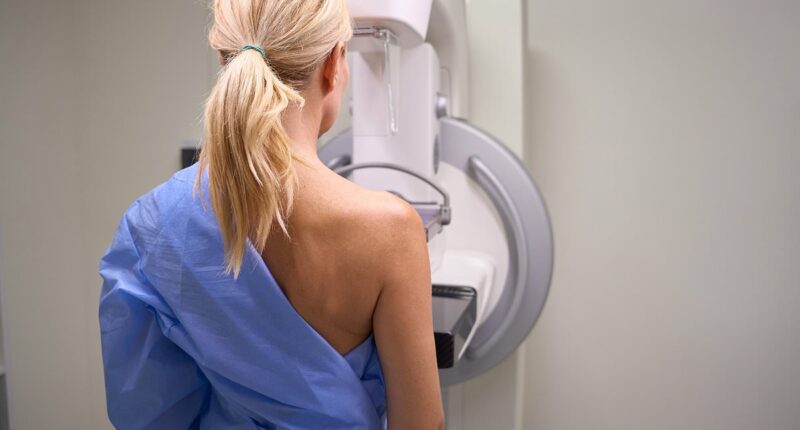Share this @internewscast.com
Cancer survivors could see the disease return with a vengeance if they contract a common virus, new research suggests.
A study, led by scientists from the University of Colorado Anschutz Medical Campus, looked at how Covid-19 and influenza could awaken dormant breast cancer cells that have spread to the lungs.
In remission, dormant cancer cells can exist undetected in the body and may reactivate years later, potentially leading to the disease’s spread.
During the Covid-19 pandemic, anecdotal reports suggested a possible increase in cancer death rates, bolstering the idea that severe inflammation from the virus might play a role in arousing dormant cancer cells.
Researchers tested this hypothesis in a lab setting using mice with breast cancer tumors and dormant cancer cells in their lungs.
The mice were exposed to either SARS-CoV-2 (the virus that causes Covid-19) or the influenza, flu, virus.
In both cases, the respiratory infections triggered the reawakening of dormant cancer cells in the lungs.
Within days of infection the cancer cells rapidly spread in the mice and the secondary tumors appeared within two weeks.

Two common viruses may ‘reignite’ cancer cells in people decades after remission, new research has found (stock image)
Commenting on the findings, study supervisor Dr James Degregori said: ‘Dormant cancer cells are like the embers left in an abandoned campfire, and respiratory viruses are like a strong wind that reignites the flames.’
A further analysis found that the awakening of dormant cancer cells is driven by the release of an inflammatory immune protein, called interleukin-6 (IL-6).
In an effort to fight off viruses, the body ramps up production of various immune cells, including IL-6.
But these well-intentioned molecules can lead to out-of-control inflammation in other areas of the body, which in turn, reawakens cancer cells in remission.
The researchers say that the identification of IL-6 as a key trigger could help in developing new treatment plans to stop the chain reaction from happening.
Dr Aguirre-Ghiso suggests the possibility of using using IL-6 inhibitors or other targeted immunotherapies to prevent the cancer from returning and spreading.
Along with the lab study, the researchers analyzed two large health databases and found support for their hypothesis that respiratory infections can recharge cancer among patients who are in remission.
The UK Biobank has information on more than 500,000 participants who were diagnosed with cancer and other diseases prior to the Covid-19 pandemic.
Researchers from Utrecht University and Imperial College London, who collaborated with the University of Colorado Anschutz Medical Campus team, investigated whether a Covid-19 infection increased the risk of death among cancer patients.

The above graph shows the change in cancer case rates around the world
They focused on cancer survivors who had been diagnosed at least five years before the pandemic, ensuring they were likely in remission.
This took into account all cancers in different parts of the body, not just in the breast.
Among them, 487 individuals tested positive for Covid-19 and these were compared to 4,350 matched controls who tested negative.
After excluding those cancer patients who died from Covid-19, the researchers found that cancer patients who tested positive for the virus faced nearly double risk of dying from the disease compared to those patients with cancer who had tested negative.
‘The effect was most pronounced in the first year after infection,’ said Dr Roel Vermeulen of Utrecht University.
The researchers said the rapid progression of cancer they found when analyzing the data banks mirrored the quick expansion of dormant cancer cells in the mouse study.
From the second population study, Dr Junxiao Hu and Dr Dexiang Gao drew data from the US Flatiron Health database pertaining to female breast cancer patients seen at 280 cancer clinics in the US.
In the US, there are more than 300,000 new cases of breast cancer and over 42,000 deaths annually. These numbers include both invasive and non-invasive cases for women, as well as cases in men.
They compared the incidence of tumors spreading to the lung among Covid-19-negative patients and those who tested positive for the virus (36,216 and 532 patients respectively).
During the follow-up period of approximately 52 months, those patients who came down with Covid-19 were almost 50 percent more likely to experience metastatic progression to the lungs compared with patients with breast cancer who did not contract the disease.
In conclusion, Dr Vermeulen said: ‘Our findings suggest that cancer survivors may be at increased risk of metastatic relapse after common respiratory viral infections.
‘It is important to note that our study focused on the period before COVID-19 vaccines were available.’
The researchers SAID their findings, published in the scientific journal Nature, indicate that individuals with a history of cancer ‘may benefit from taking precautions against respiratory viruses, such as vaccination when available, and discussing any concerns with their healthcare providers’.












